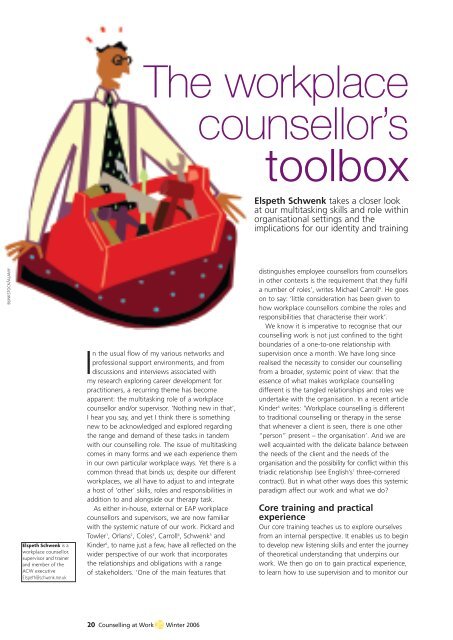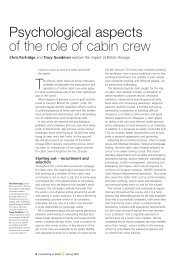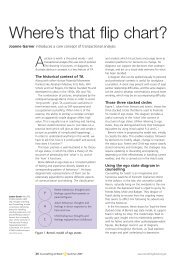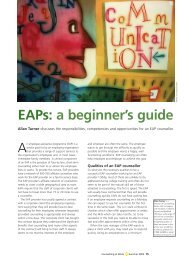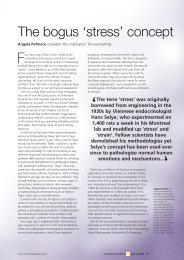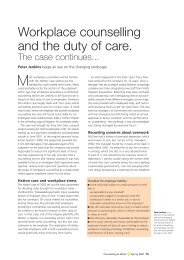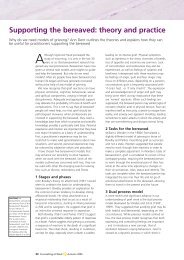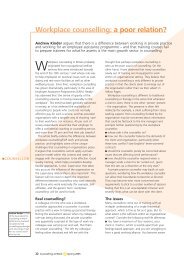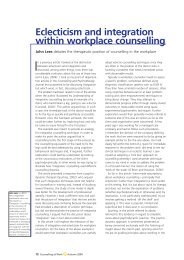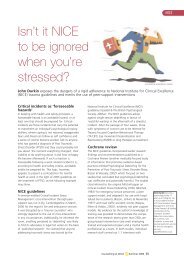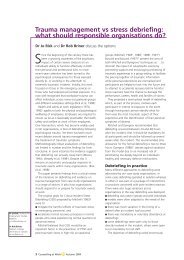The workplace counsellor's toolbox - BACP Workplace
The workplace counsellor's toolbox - BACP Workplace
The workplace counsellor's toolbox - BACP Workplace
- No tags were found...
You also want an ePaper? Increase the reach of your titles
YUMPU automatically turns print PDFs into web optimized ePapers that Google loves.
<strong>The</strong> <strong>workplace</strong>counsellor’s<strong>toolbox</strong>Elspeth Schwenk takes a closer lookat our multitasking skills and role withinorganisational settings and theimplications for our identity and trainingBLINKSTOCK/ALAMYElspeth Schwenk is a<strong>workplace</strong> counsellor,supervisor and trainerand member of theACW executiveElspeth@schwenk.me.ukIn the usual flow of my various networks andprofessional support environments, and fromdiscussions and interviews associated withmy research exploring career development forpractitioners, a recurring theme has becomeapparent: the multitasking role of a <strong>workplace</strong>counsellor and/or supervisor. ‘Nothing new in that’,I hear you say, and yet I think there is somethingnew to be acknowledged and explored regardingthe range and demand of these tasks in tandemwith our counselling role. <strong>The</strong> issue of multitaskingcomes in many forms and we each experience themin our own particular <strong>workplace</strong> ways. Yet there is acommon thread that binds us; despite our different<strong>workplace</strong>s, we all have to adjust to and integratea host of ‘other’ skills, roles and responsibilities inaddition to and alongside our therapy task.As either in-house, external or EAP <strong>workplace</strong>counsellors and supervisors, we are now familiarwith the systemic nature of our work. Pickard andTowler 1 , Orlans 2 , Coles 3 , Carroll 4 , Schwenk 5 andKinder 6 , to name just a few, have all reflected on thewider perspective of our work that incorporatesthe relationships and obligations with a rangeof stakeholders. ‘One of the main features thatdistinguishes employee counsellors from counsellorsin other contexts is the requirement that they fulfila number of roles’, writes Michael Carroll 4 . He goeson to say: ‘little consideration has been given tohow <strong>workplace</strong> counsellors combine the roles andresponsibilities that characterise their work’.We know it is imperative to recognise that ourcounselling work is not just confined to the tightboundaries of a one-to-one relationship withsupervision once a month. We have long sincerealised the necessity to consider our counsellingfrom a broader, systemic point of view: that theessence of what makes <strong>workplace</strong> counsellingdifferent is the tangled relationships and roles weundertake with the organisation. In a recent articleKinder 6 writes: ‘<strong>Workplace</strong> counselling is differentto traditional counselling or therapy in the sensethat whenever a client is seen, there is one other“person” present – the organisation’. And we arewell acquainted with the delicate balance betweenthe needs of the client and the needs of theorganisation and the possibility for conflict within thistriadic relationship (see English’s 7 three-corneredcontract). But in what other ways does this systemicparadigm affect our work and what we do?Core training and practicalexperienceOur core training teaches us to explore ourselvesfrom an internal perspective. It enables us to beginto develop new listening skills and enter the journeyof theoretical understanding that underpins ourwork. We then go on to gain practical experience,to learn how to use supervision and to monitor our20 Counselling at Work Winter 2006
the counsellor’s <strong>toolbox</strong>work on a number of levels relating to duty of care,fitness to practise, ethics, outcomes, organisationperspective, contract, and so forth. More often thannot, we undertake yet more study and specialise ina particular theory or field of working, eg briefsolution-focused therapy or systems theory or CBT,to enhance our work; and by so doing, we continueto develop our clinical skills. Finally, as accreditedcounsellors, we are required to fulfil our annualobligation of a minimum of 30 hours of continuingprofessional development – but in this entireprogramme of professional development havewe neglected some of the non-therapeutic butnevertheless essential, and I think, growing, ‘nutsand bolts’ element around what could generallybe called ‘other duties’?Returning to Carroll 4 : ‘To date these [other duties]have not been articulated clearly and <strong>workplace</strong>counsellors are asked to fulfil roles that counsellorsin other settings find anathema to their work. It israre that employee counsellors have one single rolewith clients; rather, they are often asked to betrainer, welfare officer, home visitor, informationgiver, advocate, consultant to managers, personneladviser, organisation change agent, as well as beingcounsellor.’ Drawing on Carroll’s 8 what?, he outlinesa list of diverse and multiple roles experienced by<strong>workplace</strong> counsellors, shown in Table 1.Ensuring counselling provisionAdvising line managers on approaching troubledemployeesEmployee counsellingTraining and health educationAdvising the organisation on policy mattersManagerial responsibilitiesWelfareCasework supervisionFacilitating organisational changeCritical incident de-briefingResearchAdvising on equal opportunitiesPublicising the serviceEducating staff about the role of counsellingDeveloping counselling provisionMonitoring effectivenessAdministrationReferralMediating between client and organisationTable 1: Multiple roles of <strong>workplace</strong> counsellorsIn my work as a <strong>workplace</strong> counselling supervisor,I come across counsellors doing considerably morethan even this awesome list would suggest, forexample:■ report writing and record keeping – includingservice statistics■ case conferencing and presentation■ conducting stress audits and compiling auditreports■ stress management training■ trauma debriefing, reports and admin■ information and guidance to clients and otherstakeholders■ assessment and risk management■ legal documentation or consultation, for disciplinary,capability, bullying, harassment, sexual or other formsof abuse■ mediation■ coaching■ speaking to and working alongside multidisciplinaryteams■ committee work and cross-organisationrepresentation■ policy making■ defending the service, marketing and promotion■ management training on a range of issues:absenteeismstaff appraisalsassertivenessrelationshipscommunication skillsmental health awarenessbespoke projectsmanaging trauma■ bidding for funding, new work■ maintaining a budget■ office management■ annual reports■ evidence-based audit and evaluation■ clinical governance■ developing and contracting new business.I’m sure we can all add to this list other tasks thatwe routinely undertake – but even from this list it isapparent that <strong>workplace</strong> counsellors and supervisorsneed to develop, and be prepared to develop, asubstantial raft of skills in addition to their therapeuticacumen. For example, such responsibilities as PR andmarketing the service, IT and administrative skills,strategic thinking, staff management and recruitment,being able to ‘defend’ and justify the service, budgetkeeping and so forth. This broad range of tasks isacknowledged by <strong>BACP</strong> in its information sheet onthe challenge of working in a multitasking job 9 .Some of us may come with these skills while thoseof us attracted to the field of counselling becauseCounselling at Work Winter 2006 21
the counsellor’s <strong>toolbox</strong>‘We would be wise totake a long hard look atthe total package of ourwork and put in placetraining and developmentthat will equip us for thewhole job, and not justa part of itof its therapeutic focus may feel a little dismayed athaving to divide our time and deploy our energiesthus. However, because of the therapeutic natureof our work, it is not simply a matter of adjustingor accepting this additional aspect to our workload– it is essential that we develop an understandingof the practical and ethical implications and therelationship between our counselling and this ‘otherduties’ aspect of our employment.This brings into sharp relief that challengingquestions ‘who is my client?’ and ‘whose side isthe counsellor on?’ in Kinder’s 6 recent article. Heoffers a series of challenging questions about the<strong>workplace</strong> counsellor’s role and task, and beneaththis lies both a sophisticated skill set and a clearethical and contractual understanding. Reportwriting, for example, is a prime situation whenwe need to carefully consider our contractualresponsibilities and obligations, ethical framework,duty of care and so forth. Sometimes it is difficultto square the circle and hold together the polaritiesof the various interested parties while maintainingservice neutrality.Additional skills and CPDFor those of us who have trained and workedextensively in the counselling world, but not gainedany of these additional skills, the demands of<strong>workplace</strong> counselling will only increase and thesedemands bring pressure and stress and perhaps roleconfusion. For years we have accustomed ourselvesto case notes and simple forms of record keeping.But for those counsellors already involved in servicemanagement and the IT technicalities of evidencebasedcounselling, data protection, and the rangeof PR/marketing, policy making and trainingdemands, they already appreciate how they haveeither rapidly begun to develop these skills orre-engineered skills gained in a previous occupation.Either way, perhaps it is time to acknowledgethe broader remit of a <strong>workplace</strong> counsellor and/or‘supervisor and the implications this has on counsellortraining and CPD. Since these ‘other duties’ canconsume a considerable portion of our time andworkload, they need to be more fully acknowledgedand integrated into core training and advancedtraining. It is no longer sufficient to have highlydeveloped counselling skills and theoreticalunderstanding without the capacity to deliver onthese other, increasingly essential and frequent,aspects of our work. It is time now to considercreative and accessible ways of providing bespokeCPD that enables practitioners to gain these essentialskills and introduce a greater awareness of thisgrowing element of our work during training andprofessional development.Having taught counselling from certificate todiploma level for many years, I can well appreciatethat making room in the curriculum for a nontherapeuticmodule on this topic might not be wellreceived. However, as we consider ‘fitness to practise’and ‘fit for purpose’ against the backdrop of ourethical framework, these issues do come into focus.If we are to contribute to organisation policy onemployee wellbeing, be called upon to prepareproposals and bid for new work, defend our service,participate in areas of possible litigation and managethe service and thus represent the profession ofcounselling and psychotherapy to other disciplines,then we must take on board the seriousness ofthese tasks and not eschew them in favour of ourtherapeutic preferences.While this topic seems mundane and detractsfrom our core sense of identity and raison d’etreas a counsellor, counsellor-manager or supervisor,we would be wise to take a long hard look at thetotal package of our work and put in place trainingand development that will equip us for the wholejob, and not just a part of it. Certainly servicemanagers have their time and efforts well deployedin these non-counselling tasks, but individual portfoliopractitioners, and <strong>workplace</strong> counsellors innon-management roles, will find themselvesundertaking several of these tasks quite frequently.Coles 3 draws our attention to some of the systemicrelationship issues that are deeply embedded withinthis context of counselling work: ‘I believe thatcounsellors may have a certain fixed lifespan withinan organisation and then they move into somethingelse through promotion or demotion, throughchange of interest or when they finish their usefullife in one organisation and leave to find another ...Working within organisations can feel like a strugglingoctopus where each of the eight arms grappleswith a different problem. In order to cope with thedifferent demands the <strong>workplace</strong> counsellor needsto have eight powerful arms, each with different22 Counselling at Work Winter 2006
the counsellor’s <strong>toolbox</strong>skills, suckers and muscles. He or she is not just acounsellor but has to be many things to many peoplein the organisation.’ Copeland 10 picks up on thisremarkable multitasking as she explores the role ortask of the <strong>workplace</strong> counselling supervisor, wherelinks have been made with the roles of mentor,coach and consultant.In a recent review of her book I wrote: ‘Thisbook ... should become essential reading for anysupervisor associated with <strong>workplace</strong> counselling... Copeland places the organisation as the centraldynamic that impacts upon the work of bothcounsellor and supervisor ... She examines roles andresponsibilities; ethics and the unique dynamicsassociated with the potential demands and dilemmasof <strong>workplace</strong> counselling; the systemic impact ofculture, business, and management conflicts; thecontractual process; the supervision rhombus; andfinally, she outlines the task of reporting, evaluationand assessment.’ 11 She advocates a more proactiverole for supervisors working within organisations;promoting a developmental approach whereby‘supervisors, working initially through the superviseeand their line manager, can influence processesand systems that will not only benefit the clientsbut the organisation too’ 10 . This reflects Copeland’sunderstanding of the opportunity for new thinkingregarding career development – targeting supervisorswho are ready to widen their horizons and contributetheir skills to benefit the organisation, therebyreflecting the emerging landscape of counsellingsupervision within organisations.Understanding our identityTo date, traditional CPD has tended to focus onthe acquisition of additional therapeutic skills andknowledge and ethical practice – all of which areessential ingredients. However, perhaps we shouldreassess this ‘other’ element of our <strong>workplace</strong>counselling and supervision, that has an increasingdemand upon our time and for which many of usare substantially less than well equipped and trained.With regulation on the horizon, together withAgenda for Change and the Knowledge SkillsFramework that is applicable within the NHS, it istimely to consider the whole package of what wedo as <strong>workplace</strong> counsellors/supervisors. We are inan age where we must account for the detail ofour workload and this includes those ‘other duties’alongside our therapeutic work. It is time to broadenour understanding of our identity to include thewider remit of our multitasking role and reflect thefull range of our toolkit in both the job descriptionand possible banding of our job, and in the trainingthat will support and underpin that work.This also applies to the many ‘portfolio’ counsellorswho deliver EAP counselling or supervision. It isessential that we equip them with the organisationalknow-how: the systemic knowledge and understandingof working alongside and within anorganisation, the contractual process that willsafeguard their ethical and practice wellbeing, andoffer clarity regarding the range of professionalboundaries and duties, as outlined above. With theadvances in technology, e-counselling, telephonecounselling etc… more flexible ways of working arerapidly developing and the <strong>workplace</strong> counsellorand supervisor is at the forefront of this fast pacedfield and should pause to ensure that their trainingreflects these advances and that their identity androle description fully embraces and acknowledgesthe range of work they undertake.Within the Association for Counselling at Work,we have been exploring this need alongside thenatural stages of practitioner development set outby Stoltenberg and Delworth 12 developing a CareerDevelopment Matrix that begins to map out thesector specific development requirements forpractitioners. What has become apparent however,is the significant lack of training and developmentopportunities available to <strong>workplace</strong> counsellorsand supervisors to gain the necessary knowledgeand business acumen they need to manage andrespond to the range of ‘other duties’ outlined inthis article. Clearly there is an opportunity in thetraining and development marketplace for bespoke,‘fit for purpose’ CPD that will equip <strong>workplace</strong>counsellors and supervisors alike for the ongoingchallenges found in this exciting field of work. ■References1 Pickard E, Towler J. <strong>The</strong> invisible client. Counsellingat Work. 2003;42:2-4.2 Orlans V. Counselling services in organisations.Personnel review. 1986;15(5):19-23.3 Coles A. Counselling in the <strong>workplace</strong>. UK: OpenUniversity Press; 2003.4 Carroll M. <strong>Workplace</strong> counselling. London: Sage; 1996.5 Schwenk E. Developing work contracts. Counsellingat Work. 2003;43:10-13.6 Kinder A. <strong>Workplace</strong> counselling: a poor relation?Counselling at Work. 2005;48:22-4.7 English F. <strong>The</strong> three-cornered contract. TransactionalAnalysis Journal. 1975;5(4):383-4.8 Carroll C Building Bridges a study of employeecounsellors in the private sector. Unpublished MScdissertation. City University, London; 1994.9 Gabriel L. Information Sheet P5: <strong>The</strong> challenge ofworking in a multitasking job. Rugby: <strong>BACP</strong>; 2004.10 Copeland S. Counselling supervision inorganisations: professional and ethical dilemmasexplored. London: Routledge; 2005.11 Schwenk E. Reviews. Counselling at Work. 2005;50:30.12 Stoltenberg CD, Delworth U. Supervising counsellorsand therapists: a developmental approach. London:Jossey-Bass Publishers; 1987.Counselling at Work Winter 2006 23


